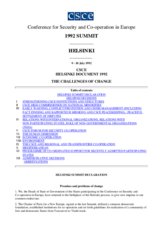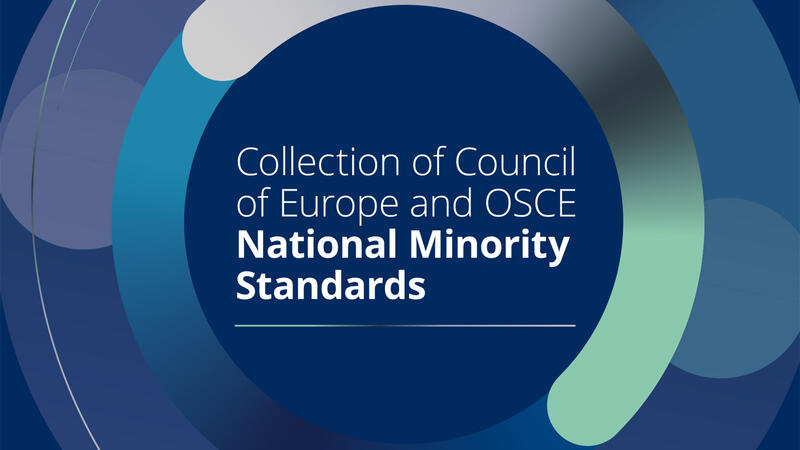
About us

The High Commissioner on National Minorities is an instrument of conflict prevention at the earliest possible stage, and provides early warning and early action in regard to tensions involving national minority issues.
Mandate
Early warning and early action in regard to tensions involving national minority issues.
Conflict prevention
The mandate describes the High Commissioner as an instrument of conflict prevention at the earliest possible stage. This includes providing early warning and early action in regard to tensions involving national minority issues.
The mandate is essentially two-fold: to contain and de-escalate tensions, and to alert the OSCE when a situation threatens to develop beyond a level which the High Commissioner is able to contain with the diplomatic means at the institution’s disposal.
Early warning
Two formal “early warnings”, as defined in the mandate, have been issued: on the former Yugoslav Republic of Macedonia in 1999 and on Kyrgyzstan in 2010. The High Commissioner also performs a less formal early warning role through his regular contacts with the Chairperson-in-Office and the participating States.
Early action
The High Commissioner works to identify and address both the short-term triggers of tensions or conflict, as well as taking a long-term structural view. This includes efforts to assist the integration of diverse societies, making them more cohesive, resilient and stable. In the High Commissioner’s view, building inclusive societies is essential for sustainable peace.
The High Commissioner is empowered to conduct on-site missions and to engage in preventive diplomacy. This involves extensive travelling and regular contact with minority and government representatives.
The High Commissioner provides confidential advice to governments in the form of letters and at discussions during visits. This engagement is usually followed up with further assistance, including with developing legal and policy frameworks. The office of the High Commissioner may also provide structural support through small collaborative projects that aim to build capacity.
The successive High Commissioners have encountered a number of recurring issues in their work. In response, they have published thematic Recommendations and Guidelines that give advice on common challenges and best practice based on experience and expertise.
As a conflict prevention instrument within the OSCE’s politico-military dimension, the High Commissioner does not function as an ombudsperson for minorities or an investigator of individual human rights violations.
The High Commissioner also does not deal with situations involving organized acts of terrorism, or communicate with any person or organization that practices or publicly condones terrorism or violence.
Confidentiality and independence
The High Commissioner works in confidence and acts independently of all parties directly involved.
The decision as to where and when to become engaged is left to the High Commissioner’s discretion and does not require the approval of the state concerned or of the Permanent Council.
While working confidentially and independently, the High Commissioner is nevertheless accountable to the OSCE participating States. The High Commissioner regularly briefs the Permanent Council, keeps the Chairperson-in-Office informed and works closely with other OSCE and international institutions. This gives the High Commissioner the political support necessary to fulfil the mandate.
What is a "national minority"?
Although there is no universally agreed definition of “national minority”, the mandate makes it clear that this includes ethnic, linguistic and religious minorities. The High Commissioner uses the term “national minority” to refer to a wide range of persons, including ethnic, religious, linguistic and cultural communities, regardless of whether these groups are recognized as such by the states where they reside and irrespective of the designation applied to or claimed by them.
Leadership
The High Commissioner leads an office of approximately 30 staff in The Hague.
History
Established in 1992 at the third CSCECSCE
Conference on Security and Co-operation in Europe Summit in Helsinki.
In 1992, the participating States met in Helsinki to agree on how to respond to the consequences of the end of the cold war. Economic decline, social tension, aggressive nationalism, intolerance, xenophobia and ethnic conflicts threatened stability in the OSCE area. Gross violations of OSCE commitments in the field of human rights and fundamental freedoms, including those related to national minorities, posed a threat to peaceful development. In response, the participating States decided to establish a High Commissioner on National Minorities.
The High Commissioner is mandated to provide early warning and early action at the earliest possible stage in regard to tensions involving national minority issues which have not yet developed beyond an early warning stage, but, in the judgement of the High Commissioner, have the potential to develop into a conflict within the OSCE area, affecting peace, stability or relations between participating States.
The Dutch Statesman Max van der Stoel was appointed as the first High Commissioner on National Minorities on 15 December 1992.

Max van der Stoel, first OSCE High Commissioner on National Minorities, appointed on 15 December 1992.


